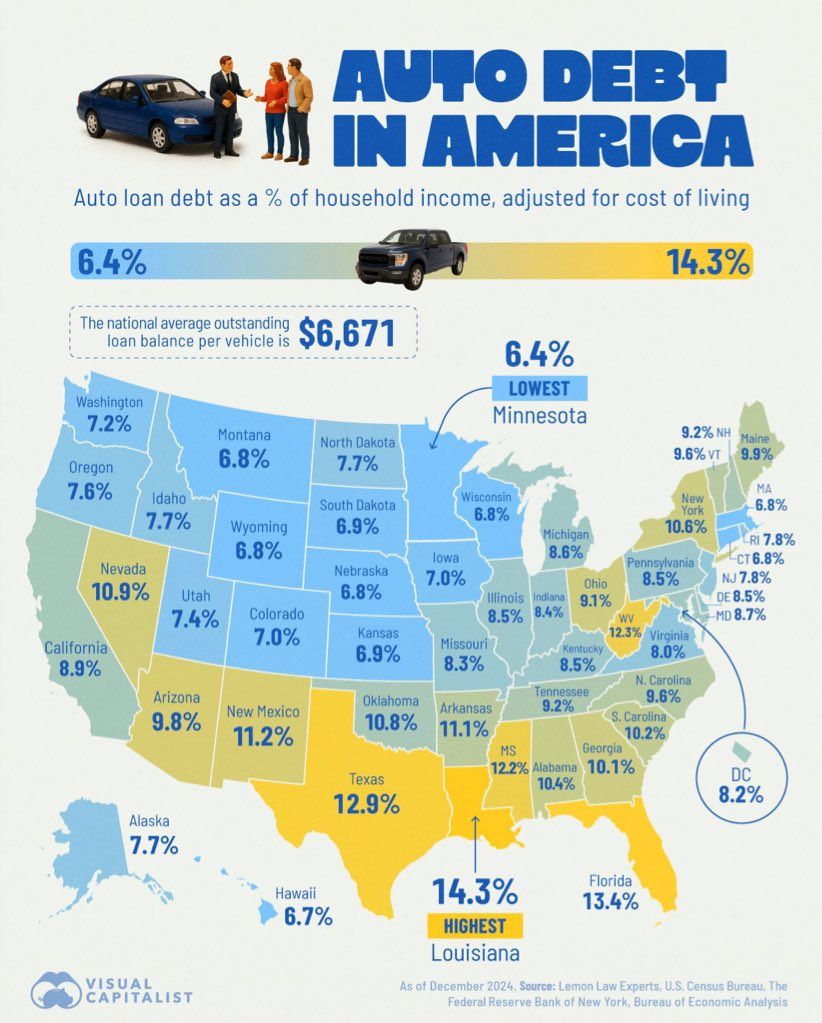Mildly interesting
-
"Taxi" is one of the few (maybe only?) words that means the same and sounds the same in (almost) every language in the world.
English – Taxi (pronounced: /ˈtæksi/)
Chinese (Mandarin) – 計程車 (okay - this is not quite taxi. Actually means "car that calculates by distance". LOL. But if you say "taxi", everybody will understand you.)
Spanish – Taxi (pronounced: /ˈtak.si/)
French – Taxi (pronounced: /takˈsi/)
German – Taxi (pronounced: /ˈtaksi/)
Russian – Такси (tak-si)
Arabic – تاكسي (tak-see)
Japanese – タクシー (takushii)
Hindi – टैक्सी (taiksee)
Indonesian - taksi
Thai - แท็กซี่ (tháek sîi)
Japanese - タクシ (takushi)
ーetc. -
@jon-nyc said in Mildly interesting:

I don’t know that’s a very useful stat. The percentage of income is going to drop as the car is paid off.
-
One imagines that at a population level it’s pretty stable and depends on both economic factors and social factors.
How much of those large numbers in the south east are due to young men really wanting a big ass truck?
Also there’s a large population for whom ‘paying off a car’ isn’t a thing. One leases in perpetuity because it’s the “cheapest” (sic) way to own a car.
-
One imagines that at a population level it’s pretty stable and depends on both economic factors and social factors.
How much of those large numbers in the south east are due to young men really wanting a big ass truck?
Also there’s a large population for whom ‘paying off a car’ isn’t a thing. One leases in perpetuity because it’s the “cheapest” (sic) way to own a car.
@jon-nyc said in Mildly interesting:
One imagines that at a population level it’s pretty stable and depends on both economic factors and social factors.
How much of those large numbers in the south east are due to young men really wanting a big ass truck?
Also there’s a large population for whom ‘paying off a car’ isn’t a thing. One leases in perpetuity because it’s the “cheapest” (sic) way to own a car.
Are leases auto debt calculated at the total cost of the vehicle or the total lease commitment for this purpose?
-
@jon-nyc said in Mildly interesting:
When over the last 100 years hasn’t the majority of the wealth been in the generation’s whose children are now adults and self reliant. As life expectancies have increased, it’s natural for that to shift even more. The issue isn’t where the wealth is concentrated, the issue is the costs of first time home ownership as a percentage of income as well as the costs of education. And it’s a cascading effect as parents are less able to contribute as much to the education and initial savings.
-
@jon-nyc said in Mildly interesting:
One imagines that at a population level it’s pretty stable and depends on both economic factors and social factors.
How much of those large numbers in the south east are due to young men really wanting a big ass truck?
Also there’s a large population for whom ‘paying off a car’ isn’t a thing. One leases in perpetuity because it’s the “cheapest” (sic) way to own a car.
Are leases auto debt calculated at the total cost of the vehicle or the total lease commitment for this purpose?
@LuFins-Dad said in Mildly interesting:
@jon-nyc said in Mildly interesting:
One imagines that at a population level it’s pretty stable and depends on both economic factors and social factors.
How much of those large numbers in the south east are due to young men really wanting a big ass truck?
Also there’s a large population for whom ‘paying off a car’ isn’t a thing. One leases in perpetuity because it’s the “cheapest” (sic) way to own a car.
Are leases auto debt calculated at the total cost of the vehicle or the total lease commitment for this purpose?
My bad. I was thinking of that as payment as a percentage of income. Leases wouldn’t show up in this data at all.
-
@jon-nyc said in Mildly interesting:
When over the last 100 years hasn’t the majority of the wealth been in the generation’s whose children are now adults and self reliant. As life expectancies have increased, it’s natural for that to shift even more. The issue isn’t where the wealth is concentrated, the issue is the costs of first time home ownership as a percentage of income as well as the costs of education. And it’s a cascading effect as parents are less able to contribute as much to the education and initial savings.
I think the general shape of intergenerational wealth shift is unchanged in the modern era but the timing has probably shifted considerably for the reasons you state - homeownership is a big chunk of middle class wealth as they age and younger generations are starting that much later.
-
Some literally Olympic-caliber break dancing at a town hall:
Link to video
-
https://www.nytimes.com/athletic/6637577/2025/09/18/mlb-baseball-lifespan-pitches-phillies-yankees/
I like baseball but I didn’t know a lot of the stuff in this article
To be game-ready, though, the balls must be stored for two weeks, untouched, in a humidor set to 70 degrees at 57 percent relative humidity. Three hours before each game, clubhouse attendants apply a mixture of water and mud to 192 balls (16 dozen), which are then inspected by an MLB gameday compliance monitor. Fourteen dozen approved balls, or 168, must be available for each game.
-
-

In 2013, a Detroit man bought a house next to his ex-wife, then spent $7,000 on a 12-foot bronze middle finger statue, complete with spotlights, pointed directly at her window.
Sometimes, history isn’t just about wars or kings, it’s about the lengths people will go for a personal grudge.
In Detroit in 2013, Alan Markovitz, a local strip club owner, made headlines when he purchased a house next door to his ex-wife. Instead of quietly moving on, he commissioned a massive 12-foot bronze statue of a hand flipping the middle finger and planted it in his yard so it would point squarely at her home. To ensure the gesture couldn’t be missed, he installed spotlights to keep the statue illuminated through the night.
The story quickly spread online, becoming an infamous example of what some called the “pettiest divorce revenge in history.” While some admired the audacity, others criticized the move as a permanent reminder of bitterness. Markovitz himself admitted he didn’t expect the monument to go viral, but once photos circulated, the statue became internet lore.
Fun Fact: This wasn’t just a neighborhood oddity, Markovitz’s statue even landed in international news, cementing its place as one of the most memorable (and expensive) acts of post-divorce revenge on record.
-
@jon-nyc said in Mildly interesting:

It says "adjusted for cost of living."
Why would they need to adjust for cost of living when it's already in percentage of household Income?@Axtremus said in Mildly interesting:
@jon-nyc said in Mildly interesting:

It says "adjusted for cost of living."
Why would they need to adjust for cost of living when it's already in percentage of household Income?Adjusting for income isn't the same as adjusting for cost of living. That said, it's not entirely clear how that adjustment works.
-

In 2013, a Detroit man bought a house next to his ex-wife, then spent $7,000 on a 12-foot bronze middle finger statue, complete with spotlights, pointed directly at her window.
Sometimes, history isn’t just about wars or kings, it’s about the lengths people will go for a personal grudge.
In Detroit in 2013, Alan Markovitz, a local strip club owner, made headlines when he purchased a house next door to his ex-wife. Instead of quietly moving on, he commissioned a massive 12-foot bronze statue of a hand flipping the middle finger and planted it in his yard so it would point squarely at her home. To ensure the gesture couldn’t be missed, he installed spotlights to keep the statue illuminated through the night.
The story quickly spread online, becoming an infamous example of what some called the “pettiest divorce revenge in history.” While some admired the audacity, others criticized the move as a permanent reminder of bitterness. Markovitz himself admitted he didn’t expect the monument to go viral, but once photos circulated, the statue became internet lore.
Fun Fact: This wasn’t just a neighborhood oddity, Markovitz’s statue even landed in international news, cementing its place as one of the most memorable (and expensive) acts of post-divorce revenge on record.
@Mik said in Mildly interesting:
In 2013, a Detroit man bought a house next to his ex-wife, then spent $7,000 on a 12-foot bronze middle finger statue, complete with spotlights, pointed directly at her window.
I’m reminded of Freud’s line: The opposite of love is not hate, but indifference.
-
@kluurs I remember reading something similar about tardigrades (water bears). The US army actually had given a grant to scientists to study them. If I remember, it related to being able to re-hydrate blood, and possibly being able to use de-hydrated blood because of its easier to store and transport.

